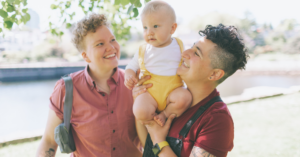Starting a family for anyone is an overwhelming experience. Add in being a member of the LGBTQIA2+ community and things get a bit more complex. While it is still an exciting time, there are many different factors to consider as an LGBTQIA2+ Parent.
You always hear the phrase ‘it takes a village to raise a child.’ And if it takes a village to raise a child then for LGBTQIA2+ individuals it certainly takes a village just to start your family. So, you should find a good strong village of people with the knowledge and willingness to help you on your journey.

Building Your Village
Typically an LGBTQIA2+ Intended Parents village will include a variety of specialists, friends, and family members. This group will entail a cadre of medical and legal professionals, fertility experts, and a support system, to name a few.
Thankfully in the USA the acceptance and visibility of LGBTQIA2+ people and their families continues to grow. Many people across the country support and vote in favor of equal rights for all LGBTQIA2+ people.
If You Need A Sperm Donor
Some couples may only require a sperm donor in order to begin their family. There are three primary methods for artificial insemination. 
The first is Intravaginal insemination (IVI), this is where the egg and sperm meet outside of the body, and then the fertilized egg (now called an embryo) is placed in the uterus. This is when you already have the egg and oven for baking it in (your uterus!). A fun way to think about this method is the ‘turkey baster’. It’s less complicated and can be done with purchased or donated sperm via a ‘turkey baster’.
For trans men or lesbians there is also the process of reciprocal IVF. This process allows both partners to biologically participate in a pregnancy. This involves using the egg of one partner and transferring the embryo into the uterus of the non-donor partner.
Then there is Intrauterine insemination (IUI), which is where the sperm is placed directly into the uterus by a medical provider. The third way of insemination is called Intracervical insemination (ICI), which is when the sperm is placed in the cervix rather than the uterus.
All three of these methods require you to find a sperm donor from a sperm bank, or have a friend who is willing to be your sperm donor.
If You Need An Egg Donor
While there is no one “type” of person, situations such as gay male couples or single men who are genetically at a disadvantage when it comes to egg production, and women who have had illnesses or conditions affecting their ovarian reserve, can lead to a need for an egg donor. Some women may also experience unexplained infertility, unsuccessful attempts at using their own eggs with a surrogate, or declining egg quality due to age.
Regardless of your specific situation, we here at The Fertility Agency are here to guide you through the egg donor journey and beyond. Our expert team will provide the support you need, from helping you find an egg donor all the way through the end of your journey.
For those using their own uterus, a consultation with a fertility doctor is necessary to confirm the need for an egg donor and ensure a healthy pregnancy. Then it is time to find an egg donor. We know that this can take some time, but be patient and you will find the perfect egg donor for you.
 If You Need A Surrogate
If You Need A Surrogate
Surrogacy is the process when a gestational carrier carries a pregnancy for you. There is no genetic connection between the gestational carrier and the baby. This could be the right option for you if you or your partner are unable to carry a baby for biological, hormonal, personal or medical reasons.
The surrogacy process can be overwhelming, so it is wise to choose to work with an experienced and knowledgeable agency that specializes in supporting them, such as The Fertility Agency.
In short the process will start with selecting a donor (egg or sperm). Then you will select a gestational surrogate and meet to ensure it is a good match.
Next it’s time to begin the process of impregnation for your gestational surrogate! This involves many doctor appointments and a few key milestones. The first milestone is the transfer day: this is the day that the embryo(s) you have created are transferred to your gestational surrogate.
Once that has happened the next milestone is the 1st Beta: this is where you get to find out if your gestational surrogate is pregnant. If not the situation will be evaluated and another transfer will be scheduled. Then you would repeat the 1st beta test until the results show that your gestational surrogate is pregnant!
Next up is the heartbeat ultrasound milestone. This is exactly what it sounds like, the first time you will get to hear your baby’s heartbeat. The final milestone event is the birth of your baby!
Throughout this process your agency will help with the legalities that come with surrogacy such as the adoption of your child for the non-biological parent in the case of a gay couple or the birth certificate and passport for international couples.
If Your Need More Than One Puzzle Piece
Now you may be in the position where you require more than one of these puzzle pieces, which is okay! The journey looks a bit different for you, but is totally doable. If you require an egg donor and a surrogate
What is an Egg Donor?
While an Egg Donor is a person who is financially compensated for this life-giving process, the earnings alone do not make an Egg Donor. This person has many other beautiful qualities that make a person who donates their eggs a great Egg Donor.
What To Look For In An Egg Donor
When looking for an Egg Donor, be sure to look for a few key qualities that all Egg Donors share. 
- Good health history
Intended parents are looking for women who have a good health history. I mean it makes sense that if you are looking for the perfect egg donor that you would want to ensure they have a good health history so that your baby in turn will also have the same great health history. - Talents or education
We are all talented in our own ways, so it’s no wonder that IPs are in search of egg donors who are talented and well educated. As any parent would want this for their children. - Looks
Now saying that IPs want a specific look may sound shallow at first, but typically most IPs are looking for an egg donor that resembles them specifically. They want their child to look like they belong with the family by ensuring the egg donor has a similar look to the intended parent.
Advanced Planning
For many members of the LGBTQIA2+ people is that parenthood requires a significant amount of resilience, research, and planning. It truly is a path that requires a village to help you along the way. A journey of a thousand miles begins with the first step. So start your research and reach out to a reputable agency to help you answer any questions.


 If You Need A Surrogate
If You Need A Surrogate